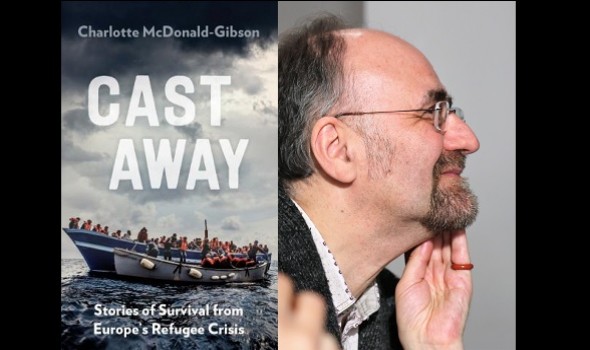'Cast Away' survival stories
'Cast Away' survival stories

Writing in 2015, Mike Berry made a basic but important point about British coverage of the recent refugee crisis: he calculated that on average only about one in ten newspaper articles made any reference to the voices of the refugees themselves. The ratio varied from title to title. In the Daily Mirror, about one in four articles included refugee’s words; in the Daily Mail, fewer than one in fourteen. Without this vital dimension, refugees can become a faceless, mindless mass, gripped by irrational urges to travel to the UK. It becomes easy to ascribe motives to them, to argue that they risk ‘the most dangerous journey in the world’ (p. 5) just to take advantage of allegedly over-generous social security provisions.
How should this crisis be covered? One solution seems obvious: get the refugees to talk; listen to them. But this is harder than it sounds. There are many practical obstacles, including:
• Linguistic: a large numbers of refugees speak some English. But to move from this to a full narrative of their odyssey is a big jump.
• Psychological: many refugees have come through great suffering. Coming to terms with such events can take years. Expecting refugees to immediately produce a perfectly made story is unrealistic.
• Political: many refugees have come from dictatorial regimes. They have grown used to keeping their mouths shut, for their own safety. They arrive in Europe with some suspicions of new authorities; sometimes these suspicions are justified. Refugees may well be unwilling to reveal their full story to a wider public, particularly when there is a danger of implicating friends or contacts who have remained back home.
Talking to refugees is therefore a more difficult, a more fraught process than it might seem.
Recent works concerning refugees have developed a new form to compensate for these problems. Starting with face-to-face interviews, writers then fill in the details of the refugees’ lives. There’s obviously an ambiguity here: they’re moving quite far from the literal, spoken words of the refugees. On the other hand, by using this method, writers create readable, memorable narratives which are more likely to inform a Western readership than a simple interview.
Charlotte McDonald-Gibson’s Cast Away uses this technique to great effect; arguably better than many previous writers. Her work is based on interviews which must have been carried out in 2015-16, and which describe events from 2011 to 2015. There are five main characters, plus other members of their family: two are Syrian, one is from a Palestinian refugee family based in Syria, one Nigerian and one Eritrean. They’re from middle-class backgrounds, which means that all of them could access savings to pay for their journeys.
The work includes moments of intense drama: for example, one can cite the experience of nine-month pregnant Sina. She had fled from Eritrea with her husband, but was forced to leave him in Sudan, while she flew on to Istanbul. Sina then had to decide by herself whether to make the dangerous journey to Greece in a 30 metre long old wooden ship. It sank within sight of Greece, but Sina was rescued by a sergeant in the Greek army who was on the beach. She named her baby after him (pp. 237—46).
Mohammad, from Syria, faced a similar disaster in a sinking boat between Malta and Italy (pp. 150—53).
The success of Cast Away lies in McDonald-Gibson’s willingness to move away from the simple words of her interviewees, and to shade in context and perspective. What emerges is something like a refugee’s history of early twenty-first-century Europe, the Middle East and North Africa. Cast Away outlines how every attempt to police European frontiers more strictly boosts the growth of people smuggling networks. While the EU governments were swift to applaud the Arab Spring, they did little or nothing to help those caught up in it. In reality, EU governments are nearly always slow, inefficient and insufficiently prepared. They drift towards a growing hostility to refugees, interrupted only by brief spasms of sympathy for the ‘nameless dead’ (p. 5).
Through the course of the work, one gets to know the five main characters well. For example, Mohammad is initially frustrated to be stuck in Malta, but eventually becomes reconciled with the country that saved his life. He attempts to give something back through volunteer work. In fact, once they recover from the trauma of their journeys, most of the characters in Cast Away seek work. McDonald-Gibson supplies context to allow us to understand the collective force of this flow of people, stressing that the vast majority still remain in camps in Turkey, Jordan and Lebanon, and only a tiny minority make the journey across the Mediterranean. She illuminates the rationality of the refugees: they are not a mindless horde, but people attempting to make difficult decisions under immensely difficult circumstances.
About ten thousand people died attempting to cross the Mediterranean in 2011—15, probably more. There is a simple solution to the number of deaths caused by illegal migration: make it legal. Allow applications for asylum from abroad. Cast Away is an eloquent testimony to the difficulties the refugees face.
Sharif Gemie is Professor of Modern and Contemporary History at the University of South Wales and is the author of several books on the history of minority and marginalised people in modern Europe.
Other References:
Mike Berry, Inaki Garcia-Blanco and Kerry Moore (eds), Press Coverage of the Refugee and Migrant Crisis in the EU: A Content Analysis of Five European Countries; Report Prepared for the United Nations High Commissioner for Refugees (Cardiff School of Journalism, Media and Cultural Studies, 2015)
Ben Rawlence, City of Thorns: Nine Lives in the World’s Largest Refugee Camp (London: Portobello, 2016).


